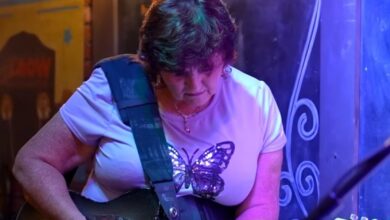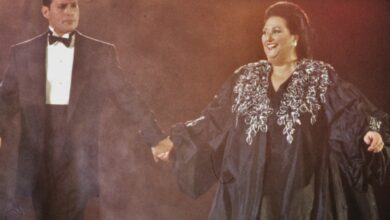The Night the Spaceman Blazed: Ace Frehley’s Timeless Triumph at Tiger Stadium
On June 28, 1996, Detroit’s Tiger Stadium pulsed with more than just the warmth of summer — it radiated with the fire of rebirth. That night marked the beginning of KISS’s Alive/Worldwide Reunion Tour, a long-awaited spectacle that reunited Paul Stanley, Gene Simmons, Peter Criss, and Ace Frehley. After years apart and countless rumors, the original lineup finally stood side by side once again. The sense of anticipation was almost tangible, like static before a lightning strike.
Even before the first note of Shout It Out Loud echoed through the night, the stage itself felt like a living organism — pulsing, glowing, and breathing fire. The iconic KISS logo illuminated the skyline while smoke cascaded over the crowd like rolling thunder. Flames erupted from both sides of the stage, and as the four descended from above, the atmosphere reached mythical proportions. Detroit — the band’s spiritual home — became the cathedral of rock resurrection.
When the music finally burst forth, it was more than a song — it was a declaration. Shout It Out Loud thundered across the venue with unrelenting force. Paul’s vocals carried defiance and joy, Gene’s bass lines thundered like a locomotive, and Peter’s drumming struck with perfect precision. Yet it was Ace Frehley’s guitar that seemed to ignite the air itself. Each note felt alive, shimmering with the kind of magic that only comes from rediscovering purpose onstage.
The crowd responded in kind. Thousands of fans, young and old, roared in unison, creating a chorus that stretched to the horizon. It wasn’t merely a concert; it was communion. The generation that grew up with KISS’s pyrotechnic glory now stood beside their children, proving that true rock anthems don’t age — they evolve. Every lyric, every riff, became a shared heartbeat echoing through Detroit’s night sky.
For Ace Frehley, this night was redemption made flesh. After years in exile, struggling through personal battles, the Spaceman stood radiant beneath the spotlights. His solo was a cosmic surge of melody and distortion — not just notes, but storytelling through sound. You could almost see the weight lift from his shoulders as his fingers flew across the fretboard. The audience felt it too, cheering not just for the musician, but for the man who had fought his way back to the stars.
Backstage, the emotions ran deep. The reunion had been anything but easy — old grievances, business disputes, and bruised egos had threatened to derail it before it began. But when the lights dimmed and the first chords struck, everything melted away. The bandmates looked at one another, paint gleaming under the stage lights, and remembered the brotherhood that had built an empire of rock. The past didn’t matter anymore; the music did.
The visuals of that show remain legendary. Fireballs erupted with every chorus, fireworks painted the stadium roof in red and gold, and Paul’s confident strut commanded attention from the first row to the farthest bleacher. When Gene’s bass roared into the finale, the vibrations traveled through steel, through skin, through memory. Detroit didn’t just host a concert — it gave birth to a miracle of sound and emotion that would echo for decades.
The essence of that Shout It Out Loud performance was more than spectacle — it was unity reborn. The song, written as an anthem for collective voice, now carried the weight of reconciliation. Each member poured their history into it, turning pain into triumph. As they played, you could almost sense time folding in on itself — four men once divided now roaring together as one unstoppable force.
Among the sea of fans, emotions overflowed. Many had waited decades to witness the original lineup resurrected under the stadium lights. Some wept openly, others screamed themselves hoarse. Parents who once saw KISS in the ’70s now lifted their kids onto their shoulders, sharing the legacy firsthand. It wasn’t just music — it was heritage, living and breathing before their eyes, bridging generations through sheer volume and joy.
When the final chords faded, the energy didn’t. The crowd’s chant of “KISS! KISS! KISS!” shook the night air like an earthquake. Fireworks still smoked overhead as the band stood arm in arm. Ace grinned — that unmistakable, boyish grin that always made him seem a little apart, a little untamed. Cameras flashed, freezing that moment forever. It was the rebirth of KISS, and Ace was once again the beating heart of the machine.
That footage would go on to define an era, revisited endlessly by fans and historians alike. Each time it resurfaces, it reignites the same rush of emotion — the fire, the unity, the unfiltered joy. For many, that Tiger Stadium show wasn’t just another performance; it was a line in the sand, marking the moment KISS transcended nostalgia and reclaimed immortality.
Now, in light of Ace Frehley’s passing in October 2025 at the age of 74, that night feels more sacred than ever. The world lost not just a guitarist but an architect of sound, a pioneer who carved melodies from the cosmos. His death marked the first time one of the original four had truly left the stage — and yet, his spirit continues to echo through that Detroit performance, forever frozen in its blaze of glory.
Ace’s guitar work that evening remains otherworldly — wild yet elegant, reckless yet precise. Every bend, every harmonic shimmer feels like a conversation between him and eternity. Watching it today, you don’t just hear rock and roll; you hear the pulse of a man whose art transcended his flaws. That solo, that smile, that cosmic spark — they’re now fragments of history, immortalized in noise and light.
For Gene, Paul, and Peter, his passing carved an unfillable void. They didn’t just lose a bandmate — they lost the brother who had helped shape their legend. For fans, it was a painful reminder that while even stars fade, the constellations they form never truly disappear. The legacy of KISS, and Ace’s shimmering stardust within it, endures every time someone presses play.
Revisiting Shout It Out Loud (Live from Tiger Stadium) now feels like stepping through time. The four stand together — vibrant, painted, unstoppable. And though Ace Frehley is gone, his laughter, his riffs, and his spirit still blaze within that performance. That night, KISS didn’t merely shout it out loud. They shouted it beyond time, ensuring that the echo would never fade.





